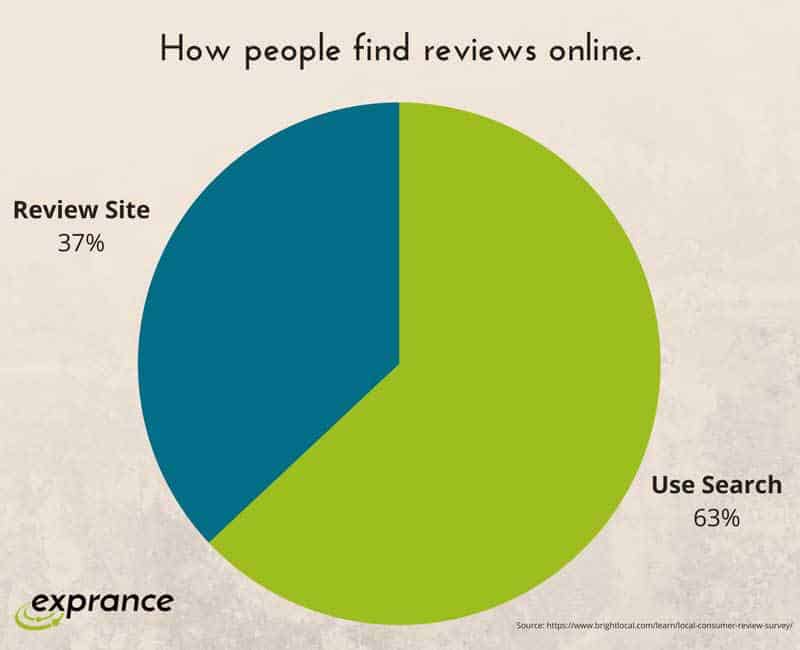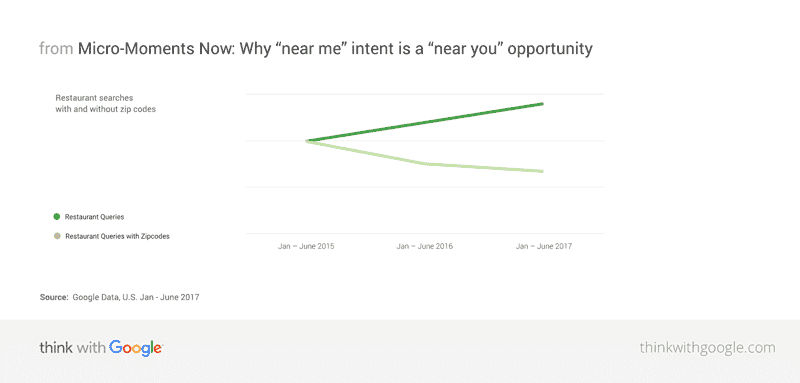How people use search engines to find businesses near them is changing. There are some things you can do to target local customers who are searching for your business though.
People used to find things to do from either the phone book (and they still print those!), word of mouth or just driving by. That changed a lot when computers came into the picture.
Of course, they really didn’t change that much. Phone books seemed to just move online but they didn’t change formats much. Word of mouth stayed the same and of course driving by too.
Eventually, the phone book format for business listings started to either go away or morphed into review sites. People now expected to hear what others thought of businesses and be able to share what they though. Sites like Yelp came onto the pictures and exploded.
Then word of mouth changed too because social media gained popularity and word of mouth now takes place on social media.
So now we’re in a position where people get suggestions from their friends on social media. Not only that but they want to learn about the business and what others think of it. Many even want to share with others about their experience.
That escalated quickly!
Now more people than ever either pick up their favorite app (like Yelp or Foursquare) to find a business or they pop their search into Google.

In fact, in a local consumer review survey from BrightLocal, they found that 64% of people from a survey searched for online reviews from a search engine while only 37% found them through review sites directly.
That means most people start on search but could, of course, end up on a review site like Yelp. That means you need to pay attention to a lot of different sources customers could find your business.
So consumers are looking for businesses and online reviews of businesses on search engines. That’s where it all starts for a growing number every day.
That’s a pretty good reason you should have a strong and consistent online presence and search engine optimization by an excellent web designer.
It’s also a VERY good reason for you to understand how people use search engines to find local businesses. How people used to search vs how they are beginning to search is changing.
Who better to take us through how consumers were searching for local businesses to the new trend than Google. They recently looked at their data to learn some insights about the shifting trends of local searches.
How People Were Searching
Search behavior of consumers changes fast. It used to be that the best way to target local customers was to target “near me” searches.
That means when people searched for a business near them they would actually type in a location modifier in addition to their search term.
For example, if I were looking for Indian food near me then I would type exactly that, “Indian food in sacramento.” Either that or I would search with the qualifier nearby.
Back in 2015 (so long ago right?) searches using “near me” grew 2X in the period of a year.¹
That paired with 82% of smartphone users were using search to find local businesses.² That’s pretty impressive considering the massive adoption of smartphones in the United States alone.
People haven’t stopped using location qualifiers paired with their searches though. They’re just not growing like they used to be.
Consumers have shifted so in order for you to target local customers you also must shift along with the consumer. It’s more of a gradual shift though rather than dropping one strategy in favor of another.
Now the shift to a different level of consumer expectations is happening.
How People Are Now Searching
There’s a shift in the terms people are using to search and they’re driven by higher expectations.
No matter how a person types in their search terms it’s expected that the search engine will understand at least the basics of their search.
That’s because people assume their smartphone knows where they are and will show them relevant local searches based off that.
So, consumers are dropping the “near me” qualifiers at a rapid pace. It’s not a mass exodus from location qualified searches though.

You can see how restaurant queries are changing. It used to be most people attached a zip code with their local search phrase. Now that’s becoming less common because smartphones know where you are.
People expect that search engines know they’re searching for something near them when a generic search term like restaurants is typed in.
It doesn’t make sense that Google would show you restaurants in Portland, Oregon when you’re located in Seattle, Washington.
On a personal note, almost every local search I do doesn’t include a local qualifier unless the first attempt doesn’t work.
When I search for gluten-free restaurants at my current location that’s all I search and Google knows to show me gluten-free restaurants around my current location.
Now that you know there’s a shift in consumer searching behavior, how do you capitalized off of this?
How You Can Capitalize Off These Searches
Capitalizing off of more limited information that searchers are providing hasn’t changed much.
You do have to understand that consumer expectations are changing though. They have higher expectations and want accurate results no matter what they input for search. There’s no reason they shouldn’t expect that either.
For local searches, Google and other search engines base them off the information they have available about your business. If you haven’t completed your Google Business Profile, website, Facebook page, and other ranking signals then Google won’t know a lot about your business.
The more directories, sites, pages, etc. that know about your business on the internet the more search engines can deliver accurate results to their users.
You can capitalize more on these local searches by getting more reviews on online review sites (assuming you have already set them up) by automating the review generation process.
Your main goal is to help local consumers find your local business through whatever means you have available.
Google and other search engines base your ranking off of many different signals. For a local business, citations are an important aspect.
There’s too much information to cover on what helps you rank locally but it all starts with getting out there on the internet. Get out there in as many places as makes sense for your market.
If you want to get into more depth, Yoast has put together an amazing 8 part series on ranking your local business.
A Few Good Tips
There’s too much to cover in depth but here are a few good tips:
- Put your business out there on relevant places on the internet.
- Make sure your business information is consistent everywhere. That means consistent name, address, and phone (NAP).
- Create as many citations as you can (without spamming irrelevant websites). That means get on every site like YP.com and every review directory (Yelp, Google Business, etc.)
- Get in the local news somehow either as an expert in your industry or just something great you’re doing in the community.
Target Local Customers With Your Online Presence
How strong and prevalent your business online presence is will determine how likely customers are to find your business.
Depending on how competitive your market is vs how much time you’ve invested will also be a deciding factor in how well your online presence will perform. You can save a lot of time with a local marketing automation tool that helps you manage your listings in the major local directories.
A strong online presence that’s everywhere paired with good optimization and consistency will help your business be where consumers are searching. You’ll rank higher in search results too!
Consumers could be searching for a great restaurant to eat at or a fun family activity on the weekend. Whoever your target audience is they’re more likely to cross your path if you’re available online.
Sources
¹ Google Trends, U.S., March 2014 vs March 2015
² Google Consumer Barometer Survey 2014/2015, U.S., n=1,000 based on internet users



